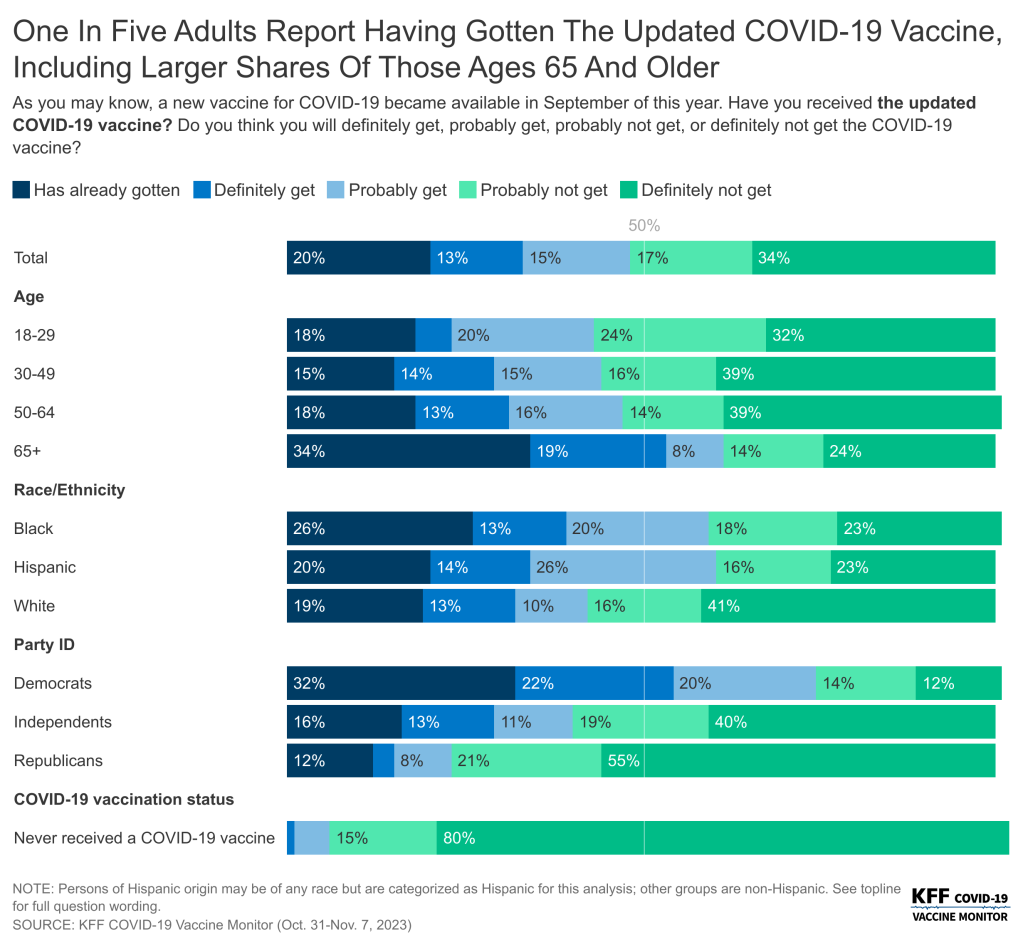
The newest KFF COVID-19 Vaccine Monitor survey reveals that half (51%) of all adults nationally say they “undoubtedly” or “in all probability” won’t get the most recent COVID-19 vaccine, with many saying that they are not fearful about catching Virus.
One in 5 individuals (20%) stated that they had already obtained the brand new vaccine that grew to become obtainable in September, and an additional 28% stated they’d “undoubtedly” or “in all probability” get the brand new vaccine. The rest stated they “undoubtedly” or “in all probability” wouldn’t get the brand new vaccine – a gaggle that features three in 10 (31%) adults who had beforehand obtained a COVID-19 vaccine however now say they don’t plan to get the newer vaccine.
Majorities of Black adults (59%) and Hispanic adults (59%) say they’ve already obtained a vaccine or count on to obtain a brand new vaccine. In distinction, a majority of white adults (58%) stated they “undoubtedly” or “in all probability” would not perceive. Partisanship additionally continues to play an enormous position in vaccine attitudes. For instance, eight in 10 (80%) Republican white adults say they don’t plan to get the brand new vaccine, greater than double the share of Democratic white adults (29%).

Amongst adults who’ve been beforehand vaccinated however haven’t but obtained their newest dose, half (52%) cited not caring about contracting the virus. Fewer individuals cited being too busy (37%), ready for a later shot (32%) or experiencing severe unwanted effects after their final shot (27%) as causes for not getting the brand new vaccine.
About 1 in 6 (16%) say they’re unable to take day without work work to get vaccinated, together with greater than a 3rd (35%) of Hispanic adults and a fifth (22%) of Black adults. About one in eight (13%) individuals cited being unable to e-book a vaccine appointment as a cause for not getting the brand new vaccine.
Coming into the fourth vacation season since COVID-19 emerged, most individuals are usually not too fearful about its potential influence on themselves or their family and friends, surveys present.
For instance, three-quarters (74%) of the general public say they’re “not too fearful” or “in no way fearful” about contracting COVID-19 throughout the holidays, almost thrice the share who’re “very” or “considerably fearful” Involved (26%). At the least two-thirds (68%) say they aren’t involved about spreading the virus to others round them, greater than twice as many as those that are involved (31%).
Persons are divided over precautions to be taken this fall and winter towards COVID-19. Half (50%) of the general public plan to take at the very least one in every of 5 potential preventive measures to scale back dangers within the fall and winter: keep away from massive gatherings (35%); put on a masks when in crowded locations (30%); keep away from journey (30%) 25%); avoiding indoor eating places (19%); or getting a COVID-19 check earlier than visiting household and buddies (18%). The opposite half deliberate to not take any of those precautions.
Individuals 65 and older, particularly these in danger for extreme COVID-19 illness, are probably to say they’ve already obtained the brand new vaccine (34%), though they’re no extra seemingly than youthful adults to say they plan to take at the very least one One in all 5 preventive measures.
Black (72%) and Hispanic (68%) adults are extra seemingly than white adults (39%) to say they plan to take at the very least one in every of these preventive measures. Likewise, Democrats (66%) are greater than twice as seemingly as Republicans (29%) to say they plan to take precautions.
The survey, designed and analyzed by KFF’s public opinion researchers, surveyed a nationally consultant pattern of 1,401 U.S. adults on-line and by telephone between October 31 and November 7, 2023. Interviews had been performed in English and Spanish. The margin of sampling error for the complete pattern is plus or minus 4 proportion factors. The margin of sampling error could also be greater for outcomes primarily based on different subgroups.